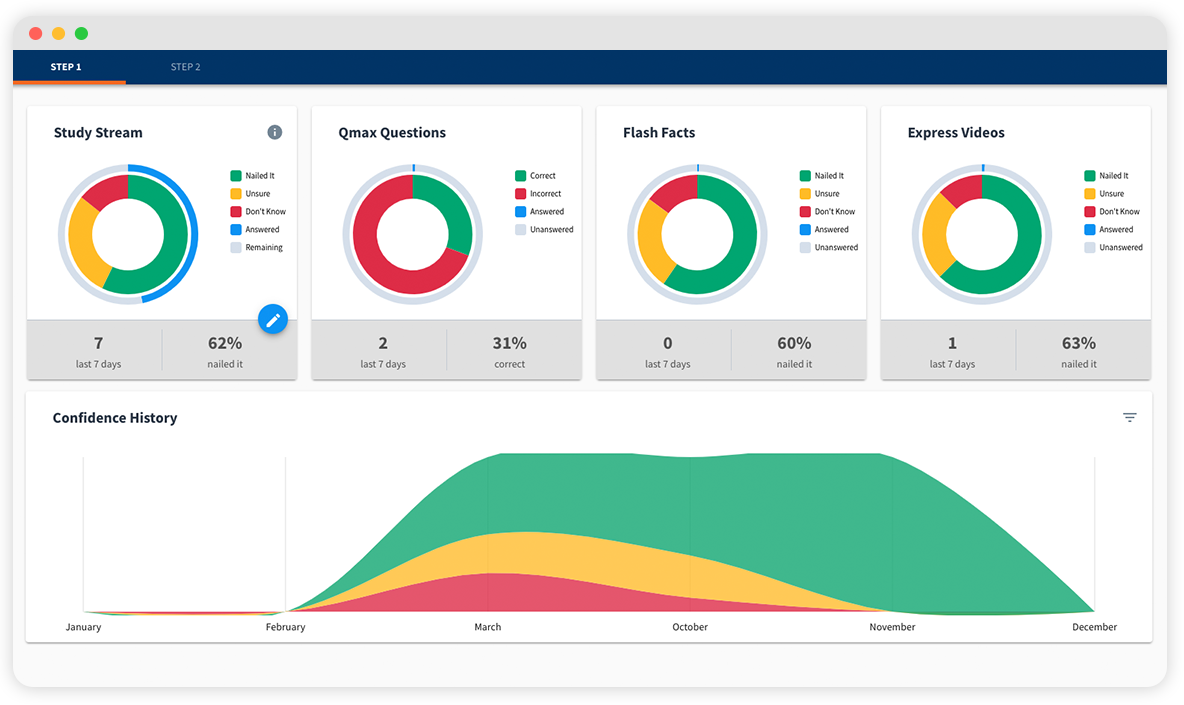Are you considering USMLE-Rx as one of your Step 1 study materials? To help you make the decision, here is our comprehensive USMLE-Rx review. Happy studying!
Available on both desktop computer and mobile app, USMLE-Rx is a collection of high-yield USMLE study tools created by the authors of First Aid. Let me repeat that: this resource was made by the authors of First Aid!
As USMLE-Rx has undergone some major renovations in the past few years, I took a critical look at their USMLE Step 1 study guide and compiled this USMLE-Rx review to provide you with all the details you need to determine how best to use these practice questions, flashcards, and video resources for Step 1 prep.
For the purposes of this review, I’ll first share the overall pros and cons of USMLE-Rx and then get into more details regarding each product within USMLE-Rx.
My Experience with USMLE-Rx
To give you some perspective, I used an early iteration of USMLE-Rx to study for my boards many years ago, and I use the current version with students preparing to sit for USMLE Step 1.
USMLE-Rx has always struck me as a somewhat more economical version of other comprehensive study tools like Doctors In Training (DIT).
USMLE-Rx Pros and Cons
Pros:
- One of the few comprehensive resources (overall material, flashcards, question bank) with a reasonable price point.
- Offers tons of content and innovative ways of presenting material. Particularly innovative is Study Stream (included in Rx360), which can be used to create spaced repetition that adapts to how you study. In most programs, the curriculum is pre-set and presented in a particular order. Study Stream lets you study in whatever order you want and the program adapts to what you’re doing.
- Since USMLE-Rx is made by the people who make First Aid, you can trust that the information provided is high yield and accurate.
- The USMLE-Rx mobile app works great and provides on-the-go access to Qmax, Express Videos, Flash Facts, and Study Stream.
- Offers a built-in mechanism for spaced repetition.
- Constantly innovating new material.
Cons:
- No feature to make flashcards from scratch.
- Videos lack entertainment value.
- Material often is a reiteration of what is found in First Aid. It would be difficult to earn a top tier score without supplementing with more in-depth material.
- No study planning is included.
- Sometimes the variety of tools is overwhelming. It would be helpful if USMLE-Rx gave you a more comprehensive plan on how to use each separate tool.
- USMLE-Rx cannot completely replace UWorld.
How to Use USMLE-Rx
USMLE-Rx is an excellent Step 1 study resource and is a great option for students who find themselves in many different test prep situations.
Express Videos are a useful tool for students who have trouble focusing while reading long First Aid passages, though these should be supplemented with qbank review and flashcards. Meanwhile, Flash Facts are great for students with a very brief study period who do not have time to make their own flashcards. And Rx Bricks provide students with easily-digestible chunks of high-yield study content.
We also recommend supplementing your USMLE-Rx study with UWorld.
Is USMLE-Rx worth the price?
Yes! The cost for USMLE-Rx is quite reasonable, especially when comparing the price of RX360 to Doctors in Training.
USMLE-Rx vs. UWorld
USMLE-Rx does not fully replace UWorld. We highly recommend using UWorld to supplement your USMLE-Rx study time.
Now for a closer look at USMLE-Rx individual products:
USMLE-Rx Rx360 Review
Rx360 is a subscription service for three USMLE-Rx products (Express Videos, Flash Facts, and Qmax, all further discussed below individually) and is the backbone of USMLE-Rx offerings. This service also includes an online (searchable) version of First Aid which serves as the foundation for much of their material.
Notably, this service does not include RX Bricks, which is a new product that can be bundled for a higher cost.
Rx360 includes a shiny dashboard that gives you stats on how much of the video, flashcard, and question-based content you’ve completed. As you go through the material you can mark the topic as “don’t know,” “OK,” or “nailed it” to keep track of what subjects you may need to review in more depth.
A newer feature is Study Stream, which prides itself on being a “spaced repetition” tool you can use to keep track of topics over time. Study Stream lets you tag previously learned topics to be resurfaced later for you to refresh your memory. Based on you tagging things as “don’t know,” “OK,” or “nailed it” the program will show you more or less of a previous topic.
This is a nice feature, and is an alternate option for tracking difficult subjects or doing a weekly review built into their respective study schedules.
Another newer feature is Smart Notes, which lets you organize notes or highlighted items from previously reviewed material.
Rx360: Pros
Rx360 gets you a lot of bang for your buck since it is a package offering three of USMLE-Rx’s top products: Express Videos, Flash Facts, and QMax.
The service provides a sleek and useful dashboard and allows you to tag topics for further study if needed.
RX360 is a great deal for what you get!
Rx360: Potential Drawbacks
The potential downsides of Rx360 are a lack of comprehensive study plan, an overwhelming amount of features, and lower quality of content via the Qmax feature, which we will get into a bit later.
Rx360: Price
This total package cost for Rx360 is about $350 for 12 months which is a steal compared to the >$800 you will pay for Doctors in Training. The amount of content you get relatively cheaply is one of the biggest selling points of USMLE-Rx.
USMLE-Rx Step 1 Express Videos Review
Step 1 Express Videos provide foundational knowledge that should be supplemented with flash cards and questions. The videos use First Aid as an outline and many of the topics and graphics are taken directly from First Aid.
This is a double-edged sword. I generally tell students that if they memorize First Aid front to back, they can generally count on scoring around 230 on Step 1.
First Aid does a wonderful job of broadly going over high-yield core content that will show up over and over again on USMLE exams until the end of time.
What First Aid lacks is deep-dive content on more nuanced and novel subjects. That lack of deeper material is the reason First Aid alone isn’t typically enough to get you above a 90th percentile score. Unfortunately, these videos rarely close that gap.
The narrators occasionally bring in clinical context and additional factoids into their discussion but for the most part stick to the script laid out by First Aid. Unfortunately, these videos are dry. They lack the entertainment value and polish of other services like DIT or Lecturio.
Still, if you have the attention span of a goldfish (like me), any video is better than trying to get through First Aid simply by reading from front to back. The addition of a margin to type notes in is a wonderful new feature that I wish I had when I went through these videos several years ago. Being actively engaged and scribbling (or typing) notes is a great way to keep from turning a video into a useless passive learning exercise.
Overall the videos are a somewhat better way of getting through the foundational knowledge, but USMLE-Rx failed to stick the landing on what I feel is one of the most fundamental parts of a comprehensive study plan.
USMLE-Rx Express Videos: Pros
USMLE-Rx Express Videos are great for students who study better by watching videos than reading textbooks to study.
Having a place to type notes in the margins is a super useful feature.
USMLE-Rx Express Videos: Potential Drawbacks
These videos stick to the First Aid script (which is great if you’re just trying to get through First Aid!) but do not cover more nuanced topics which are not covered in First Aid.
The videos are not very entertaining to watch.
USMLE-Rx Step 1 Express Videos: Price
Express Videos are available by subscriptions of various durations. The most popular subscription is one year for $149. A one month subscription is $49.
USMLE-Rx Flash Facts Review
Online flashcards and pre-made flashcard sets are everywhere in medical education these days. I can’t go through one tutoring session without someone bringing up Anki, and USMLE-Rx is cashing in on the flashcard bandwagon.
Flash Facts is a pre-made flashcard deck that can be organized and split into decks based on the First Aid table of contents-style outline. There are literally 15,000 cards to choose from.
The quality of the cards is generally top notch and often based on facts and graphics straight from First Aid. The dashboard allows you to quickly organize decks into digestible chunks and gives you lots of freedom on how to incorporate those into your study.
One problem I have with Flash Facts is the lack of ability to easily make your own flashcards. I frequently tell students how important it is to make your own flashcards; the act of creating the card is more valuable than mindlessly flipping through cards.
Obviously, pre-made flashcards are invaluable in situations when you don’t have a lot of time (like when you’re on the bus or sitting in a waiting room) but as a core component of your study plan, flashcards are relatively useless unless you take the time to make them yourself.
That being said, if your study plan does not include enough time to make cards yourself then this would provide a suitable alternative.
USMLE-Rx Flash Facts: Pros
Flash Facts flashcards are high quality, easy and quick to organize, and offer a lot of flexibility in how you study. A recommended resource for students with a short study period and no time to create their own flashcards.
USMLE-Rx Flash Facts: Potential Drawbacks
Though an excellent offering and super useful Step 1 study resource for busy med students, Flash Facts doesn’t offer an option for creating your own flashcards.
USMLE-Rx Flash Facts: Price
A one year subscription to Flash Facts is $99. One month is $29, and various other subscription lengths are available.
USMLE-Rx Step 1 Qmax Review
Similar to Flash Facts, Step 1 Qmax questions can be organized into random or topic-specific sets. There are a good number of questions available, and they mimic UWorld’s style with long question stems and very thorough explanations.
Ultimately, my gripe with the Qmax question set is the less-than-stellar question quality and lack of emphasis on testable material. UWorld questions can be difficult and frustrating, but one could conclude after reading an explanation that UWorld had a legitimate clinical or educational reason for presenting the question in a certain way.
That same feeling does not happen often with Qmax. Their questions are full of logical leaps, poorly worded questions, and material that strays too far into the land of Step 2 and Step 3.
I have given this question bank multiple tries and just can’t in good conscience recommend it. Qmax can be purchased separately from the RX360 package. Please don’t do that. Buy UWorld. Overall this is the weakest USMLE-Rx offering.
USMLE-Rx Step 1 Qmax: Pros
Questions can be organized into random or topic-specific sets.
USMLE-Rx Step 1 Qmax: Potential Drawbacks
This question bank doesn’t offer enough emphasis on testable Step 1 material, and question quality is less than optimal. We recommend using UWorld instead of USMLE-Rx.
USMLE-Rx Step 1 Qmax: Price
Step 1 Qmax is $249 for one year or $79 for one month. Various other subscription lengths are available.
USMLE-Rx Rx Bricks Review
Rx Bricks is a new product that can be purchased for $139 for a 12-month subscription or added to an RX360 subscription for about $100 extra.
To create Rx Bricks, USMLE-Rx took core topics and divided them into digestible chunks (bricks). Each brick includes some foundational knowledge divided into a paragraph and usually a graphic. Additionally, each brick has an associated question and some objectives to emphasize key points.
This provides a condensed and high-yield nugget for students with less time, or to add to a study plan or pre-made summary of the most important study topics.
The Rx Bricks layout reminds me of new residency curriculums that have appeared in the past few years. This seems to be a trend that medical educators have been particularly excited about lately, and it’s cool to see USMLE-Rx using cutting edge educational techniques.
Rx Bricks: Pros
Rx Bricks provide students with easily-digestible chunks of high-yield study content.
Rx Bricks: Potential Drawbacks
We haven’t identified any Rx Bricks drawbacks, but we also haven’t used this USMLE-Rx product as much as others.
Rx Bricks: Price
Rx Bricks is $139 for a 12-month subscription or can be added to an RX360 subscription for about $100 extra. Other subscription lengths are available.
In Summary
Though this review may be critical, my philosophy is that I want students to have all the information they need to make informed decisions regarding which study materials are right for them and which ones won’t be a good fit.
I frequently see students panic when studying for Step 1, which leads them to buy every resource they see in hopes that a new resource will be the magic cure to their studying woes.
The key to a good Step 1 study plan is using a few comprehensive resources that work best for you. USMLE-Rx will likely work for *a lot* of people. I used it to study, and overall I was very happy with my experience–even when the product had many fewer features.
For students who don’t think a single test is worth running up a credit card bill, USMLE-Rx will be a great choice for you. This product is also great for students looking to focus on using a small number of resources.
If you do choose to use USMLE-Rx, I can not emphasize enough the need to supplement with UWorld. Frankly, I don’t see much upside to using Qmax at all. Aside from Qmax, the other tools are high quality, especially for the price.
USMLE-Rx is available on your computer, tablet, or even on an app (iOS or Google Play). Overall, both the web-based version and app work well and provide essentially the same content.
USMLE-Rx Free Trial and Discount Codes
Don’t just take my review at face value. USMLE-Rx has a free five-day trial available on their website, so you can check out each of these tools yourself. USMLE-Rx also uses student brand ambassadors who can give out discount codes, so be sure to ask around for discount codes prior to purchasing.





